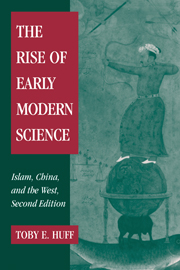Book contents
- Frontmatter
- Dedication
- Contents
- List of illustrations
- Preface to the second edition
- Preface to the first edition
- Acknowledgments
- Introduction
- 1 The comparative study of science
- 2 Arabic science and the Islamic world
- 3 Reason and rationality in Islam and the West
- 4 The European legal revolution
- 5 Madrasas, universities, and science
- 6 Cultural climates and the ethos of science
- 7 Science and civilization in China
- 8 Science and social organization in China
- 9 The rise of early modern science
- Epilogue: educational reform and attitudes toward science in the Muslim world and China since the eighteenth century
- Selected bibliography
- Index
Epilogue: educational reform and attitudes toward science in the Muslim world and China since the eighteenth century
Published online by Cambridge University Press: 05 June 2016
- Frontmatter
- Dedication
- Contents
- List of illustrations
- Preface to the second edition
- Preface to the first edition
- Acknowledgments
- Introduction
- 1 The comparative study of science
- 2 Arabic science and the Islamic world
- 3 Reason and rationality in Islam and the West
- 4 The European legal revolution
- 5 Madrasas, universities, and science
- 6 Cultural climates and the ethos of science
- 7 Science and civilization in China
- 8 Science and social organization in China
- 9 The rise of early modern science
- Epilogue: educational reform and attitudes toward science in the Muslim world and China since the eighteenth century
- Selected bibliography
- Index
Summary
The civilizations of Islam, China, and the West over the course of their histories have been inspired by contrasting images of reason, rationality, and the man of knowledge. Those images and their attendant worldviews continue to inform the present shaping the language of discourse and appearing to set limits on possibilities. From the outset, devout Muslims were inclined to think that all wisdom was contained in the Quran and that therefore all true sciences must be found therein. Such was the origin of the idea of Prophetic medicine, that is, medical knowledge derived from the sacred teachings of the Prophet Muhammad. But alongside that tradition there was another, that of Greek philosophy.
For a time the scientists and natural philosophers of Islam, and especially Arab astronomers, managed to carry on their work, reaching notable heights of broad knowledge and even preparing the way for the scientific revolution in the West. While the Greek modes of reason and logic were well known to the enlightened men of medicine, philosophy, and science, these modes were held at bay by the religious authorities, so that in the long run, no social institutions were founded that could protect and support freethinking, a term commonly denoting heresy in Islam. Down through the centuries those foundational beliefs and their institutional grounding created barriers preventing the development of modern science and democractic institutions. I shall return to this in a moment.
In China the image of the man of knowledge was first and foremost that of an enlightened individual who was also morally committed to the traditional ways. The epitome of the learned man was someone who had mastered the Confucian classics and who, through long and arduous study, understood the place of man in a harmonious cosmos. It was he who could advise the emperor on statecraft and moral affairs and, being thus enlightened, could follow a course that would avert natural catastrophes and social unrest. It was toward the goal of understanding the ebbs and flows of man and nature – the organic harmony of man and nature – that the man of learning directed his being.
- Type
- Chapter
- Information
- The Rise of Early Modern ScienceIslam, China and the West, pp. 362 - 384Publisher: Cambridge University PressPrint publication year: 2003



